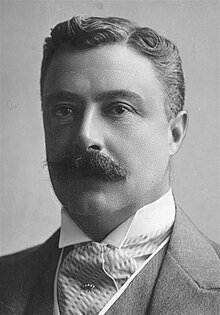William Ward, 2nd Earl of Dudley
William Humble Ward, 2nd Earl of Dudley , GCB , GCMG , GCVO PC (born May 25, 1867 in London , United Kingdom , † June 29, 1932 ibid) known as Viscount Ednam before 1885 , was a conservative British politician, Lord Lieutenant of Ireland and fourth Governor General of Australia .
Early years and political career
William Ward was born in London on May 25, 1867 . He attended Eton College . Upon the death of his father, William Ward, 1st Earl of Dudley , in 1885, Ward inherited a vast fortune along with the title of Earl of Dudley . Ward visited Australia on a sailing cruise between 1886 and 1887 . He became part of the closer circle of friends of the Prince of Wales (later King Edward VII), who was a guest at Ward's wedding to Rachel Gurney in 1891. Ward was also active in the Conservative Party and in 1895 became Secretary of State on the Board of Trade in the government of Robert Gascoyne-Cecil, 3rd Marquess of Salisbury .
In 1902 Ward was appointed to the Privy Council and appointed Lord Lieutenant of Ireland, a position in which he showed great prodigality, but also some political and administrative skills. As a Conservative, Ward could not expect a promotion from the Liberal government, which took office in 1905, however King Edward VII urged Prime Minister Sir Henry Campbell-Bannerman to offer Ward the position of Governor General of Australia, and Campbell-Bannerman agreed to do so apparently there was no suitable Liberal candidate.
Governor General of Australia
Ward arrived in Sydney in September 1908 . Here, too, he attached great importance to pomp, ceremonies and the display of his wealth, which many Australians disliked, especially the Labor Party and the radical press such as The Bulletin . Not long after his arrival, he had to swear in a Labor Cabinet under Andrew Fisher , so Labor Party's disapproval of his style, which was akin to that of a vice-king, became a major political issue.
The new governor general soon found himself embroiled in another argument. The Labor government worked to establish an independent Australian Navy . The liberal opposing side, on the other hand, supported a campaign aimed at raising money to build ships for the Royal Navy . This was the so-called dreadnought campaign. When Ward gave a speech in support of the Dreadnought campaign, he interfered with the usual practice in party politics, which led to further tensions in the relationship with Fisher.
In 1909 Fisher's minority government resigned. Ward rejected early elections, which led to the Liberals returning to government under the leadership of Alfred Deakin . Although Fisher was careful not to publicly criticize Ward, the governor general had gained a reputation as an "anti-laboratory" which made him unpopular with half of Australia's electorate.
The April 1910 elections were clearly won by the Labor Party and Fisher returned to power. Relations between the governor general and the prime minister were soon frosty again. Ward's insistence on maintaining two expensive gubernatorial residences in Sydney and Melbourne , his viceregal pomp on trips to the country, and the charter of a steam yacht to circumnavigate the continent enraged Fisher, a simple Scottish socialist.
From October 1910, Ward realized that his position had become untenable and asked to be removed. He left Australia in July 1911 without an official ceremony. Alfred Deakin wrote about him:
- His ambition was high but his interests were short-lived ... He did nothing really important, nothing thoroughly, nothing consistently ... He remained ... a very ineffective and not very popular figure head.
In gratitude for the support of the Australian Government in the Nimrod Expedition (1907-1909) named its director, British polar explorer Ernest Shackleton , originally as Mount Dudley known Dudley Head , a mountain ridge in the Transantarctic Mountains , after William Ward.
Next life
With the Liberals still in power in Britain, Ward held no further public office. During the First World War he commanded a yeomanry unit in Egypt and Gallipoli . Then he withdrew to his lands.
family
Ward married Rachel Gourney in 1891. from this marriage have four sons and three daughters, including George Ward, 1st Viscount Ward of Witley . His first wife drowned on June 26, 1920. On April 30, 1924, Ward married the well-known actress Gertie Millar , daughter of John Millar. Ward died of cancer on June 29, 1932 in London at the age of 65. The title passed to his eldest son William . His wife survived him by 20 years.
Web links
- Chris Cunneen: William Ward, 2nd Earl of Dudley . In: Douglas Pike (Ed.): Australian Dictionary of Biography . Melbourne University Press, Carlton (Victoria) 1966–2012 (English).
- William Ward at Hansard (English)
| predecessor | Office | successor |
|---|---|---|
| William Ward |
Earl of Dudley 1885-1932 |
William Ward |
| George Cadogan |
Lord Lieutenant of Ireland 1902-1905 |
John Hamilton-Gordon |
| personal data | |
|---|---|
| SURNAME | Ward, William, 2nd Earl of Dudley |
| ALTERNATIVE NAMES | Ward, William Humble, 2nd Earl of Dudley; Ward, William, Viscount Ednam |
| BRIEF DESCRIPTION | Lord Lieutenant of Ireland and Governor General of Australia |
| DATE OF BIRTH | May 25, 1867 |
| PLACE OF BIRTH | London , England |
| DATE OF DEATH | June 29, 1932 |
| Place of death | London , England |
